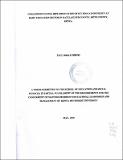Challenges facing implementation of ICT education policy at basic education sector in Katulani sub county, Kitui county, Kenya.

View/
Date
2018-05Author
Mbalo, Paul Mbuki
Type
ThesisLanguage
enMetadata
Show full item recordAbstract
Information Communication and Technology in basic education is that ability to use ICT knowledge and skills in teaching and learning. When actually applied, it is important in a number of ways. First it will help the head teachers to improve their knowledge in ICT. With that knowledge the head teachers will be in position to support ICT teachers training programmes. Secondly, teachers knowledgeable in ICT will be able to source information for students from the internet. The importance of information and communication technology (ICT) education policy in the educational perspective is quite evident worldwide, especially in Europe and the United States of America. The purpose of this study was to investigate the challenges facing implementation of lnformation Communication Technology (ICT) education policy at basic education in Katulani Sub County in Kitui County. The specific objectives were to establish the relationship between cost of ICT, support infrastructure, staff competence and relevance of software's on the implementation of ICT education policy. The study was carried out in Katulani Sub County in Kitui County. The researcher used a descriptive survey research design. The research sampled fourteen head teachers, 4 7 teachers and 107 pupils making a total of 168 respondents. Questionnaires, interview schedule and observation schedule were used for data collection in this study. Results of this data analysis were followed by interpretation and discussion. Qualitative data was analyzed qualitatively using content analysis of meanings and implications emanating from respondents' information. The results were used to enrich the quantitative results. The study established that majority of the respondents strongly agreed that, among the challenges related to cost of ICT implementation, the cost of computers and accessories were the greatest. This was followed by the cost of classrooms and furniture and cost of electricity. The study revealed that most schools did not have adequate computers as indicated by majority of respondents. The study established that the challenges related to staff competence and implementation of ICT included knowledge on how to use power point, as indicated by majority of respondents. The study also revealed that the software factors influencing utilization of ICT were; unit cost of operating system frequent modifications of the software and the inadequate money to buy software. The study concluded that the relationship between the cost and implementation of ICT education policy at basic education has been difficult due to financial pressure, while also there is inadequate infrastructure in both primary and secondary schools. It was also concluded that there is lack of enough trained teachers who can practically apply ICT, which is new to traditional teachers, while the supply of relevant and appropriate software is an issue obstructing wider application of ICT. The study recommends that schools through BoM's should mobilize additional funds to buy computers, accessories and build computer laboratories. The study further recommends the need to improve on infrastructure in schools such as computers and computer laboratories to enable the teachers use them in implementing the ICT. School administration should also ensure teachers competence in ICT skills and applications through training to facilitate them to develop school ICT policy, encourage and motivate the teachers to practically apply ICT
Skills in their teaching. Furthermore, there is need for developers of educational software to localize their products to the local market so that they are more acceptable to the teachers and learners who are the end users. It is also further recommended that the ICT policy of the Ministry of education needs to be closely aligned with the basic education curriculum.
Publisher
KeMU
